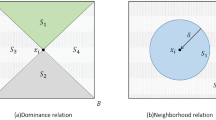Abstract
In this paper we provide the restructuring method of rough sets for analyzing fuzzy random data that many experts evaluate creative cities. Usually it is hard to clarify the situation where randomness and fuzziness exist simultaneously. This paper presents a method based on fuzzy random variables to restructure a rough set. The algorithms of rough set is used to distinguish whether a subset can be classified in the object set or not based on confidence interval. The expected-value-approach is also applied to calculate the fuzzy value with probability into a scalar value.
Access this chapter
Tax calculation will be finalised at checkout
Purchases are for personal use only
Preview
Unable to display preview. Download preview PDF.
Similar content being viewed by others
References
Florida, R.: The rise of the creative class. Basic Books, New York (2004)
Geng, Z.Q., Zhu, Q.X.: Rough set-based heuristic hybrid recognizer and its application in fault diagnosis. Expert Systems with Applications 36(2), part 2, 2711–2718 (2009)
Gil, M.A., Miguel, L.D., Ralescu, D.A.: Overview on the development of fuzzy random variables. Fuzzy sets and systems 157(19), 2546–2557 (2006)
Howkins, J.: The Creative Economy: How People Make Money from Ideas. Penguin Global (2002)
Kruse, R., Meyer, K.D.: Statistics with Vague Data. Reidel Publishing Company, Dordrecht (1987)
Kwakernaak, H.: Fuzzy random variables–I. Definitions and theorems. Information Sciences 15(1), 1–29 (1978)
Kwakernaak, H.: Fuzzy random variables–II. Algorithm and examples. Information Sciences 17(3), 253–278 (1979)
Landry, C.: The Creative City: A Toolkit for Urban Innovators. Earth Scan Publications, London (2000)
Lin, L., Zhu, J., Watada, J.: A rough set approach to classification and its application for the creative city development. Journal of Innovative Computing, Information and Control 5(12), 4859–4866 (2009)
Lin, T.Y., Cercone, N. (eds.): Rough Sets and Data Mining: Analysis of Imprecise Data. Kluwer Academic, Dordrecht (1997)
Lin, T.Y., Yao, Y.Y., Zadeh, L. (eds.): Data Mining, Rough Sets and Granular Computing. Physica-Verlag, Heidelberg (2002)
Liu, B.: Uncertainty Theory, 2nd edn. Springer, Berlin (2007)
Liu, B., Liu, Y.K.: Expected value of fuzzy variable and fuzzy expected value models. IEEE Transaction on Fuzzy Systems 10(4), 445–450 (2002)
Liu, Y.-K., Liu, B.: Fuzzy random variable: A scalar expected value operator. Fuzzy Optimization and Decision Making 2(2), 143–160 (2003)
Liu, Y.K., Liu, B.: Fuzzy random programming with equilibrium chance constraints. Infromation Sicinece 170(25), 363–395 (2005)
Liu, Y.K., Liu, B.: On minimum-risk problems in fuzzy random decision systems. Computers & Operations Research 32(2), 257–283 (2005)
López-Diaz, M., Gil, M.A.: Constructive definitions of fuzzy random variables. Statistics and Probability Letters 36(2), 135–143 (1997)
Nahmias, s.: Fuzzy variables. Fuzzy Sets and Systems 1(2), 97–111 (1978)
Negoita, C.V., Ralescu, D.A.: Application of Fuzzy Sets to Systems Analsyis. Birkhauser Verlag, Basel
Nguyen, H.T.: A note on the extension principle for fuzzy sets. Journal of Mathematical Analysis and Applications 64(2), 369–380 (1978)
Pawlak, Z.: Rough Sets. International Journal of Computer and Information Sciences 11(5), 341–356 (1982)
Puri, M.L., Ralescu, D.A.: Fuzzy random variables. Journal of Mathematical Analysis and Applications 114(2), 409–422 (1986)
Tanaka, H., Watada, J.: Possibilistic linear systems and their application to the linear regression model. Fuzzy Sets and Systems 27(3), 275–289 (1988)
Wang, G.Y., Qiao, Z.: Linear programming with fuzzy random variable coefficients. Fuzzy sets and Systems 57(3), 295–311 (1993)
Wang, S., Watada, J.: Studying distribution functions of fuzzy random variables and its applications to critical value functions. International Journal of Innovative Computing, Information & Control 5(2), 279–292 (2009)
Watada, J., Wang, S.: Regression model based on fuzzy random variables. In: Seising, R. (ed.) Views on Fuzzy Sets and Systems from Different Perspectives, ch. 26, Spring-Verlag, Berlin (2009)
Watada, J., Wang, S., Pedrycz, W.: Building confidence-interval-based fuzzy random regression models. IEEE Transactions on Fuzzy Systems 17(6) (2009) (in press)
Wikipedia. Rough Set (2008), http://en.wikipedia.org/wiki/Rough_set (Cited December 10, 2008)
Yao, J.T., Yao, Y.Y.: Induction of classification rules by granular computing. In: Alpigini, J.J., Peters, J.F., Skowron, A., Zhong, N. (eds.) RSCTC 2002. LNCS (LNAI), vol. 2475, pp. 331–338. Springer, Heidelberg (2002)
Zadeh, L.A.: The concept of a linguistic variable and its application to approximate reasoning-I. Information Science 8(3), 199–249, 8(4), 301–357, 9(1), 43–80 (1975)
Zhuang, Z.Y., Churilov, L., Burstein, F., Sikaris, K.: Combining data mining and case-based reasoning for intelligent decision support for pathology ordering by general practitioners. European Journal of Operational Research 195(3), 662–675 (2009)
Ziarko, W.: Rough sets as a methodology for data mining. In: Rough Sets in Knowledge Disco 1: Methodology and Applications, pp. 554–576. Physica-Verlag, Heidelberg (1998)
Author information
Authors and Affiliations
Editor information
Editors and Affiliations
Rights and permissions
Copyright information
© 2010 Springer-Verlag Berlin Heidelberg
About this chapter
Cite this chapter
Lin, LC., Watada, J. (2010). Restructuring of Rough Sets for Fuzzy Random Data of Creative City Evaluation. In: Huynh, VN., Nakamori, Y., Lawry, J., Inuiguchi, M. (eds) Integrated Uncertainty Management and Applications. Advances in Intelligent and Soft Computing, vol 68. Springer, Berlin, Heidelberg. https://doi.org/10.1007/978-3-642-11960-6_48
Download citation
DOI: https://doi.org/10.1007/978-3-642-11960-6_48
Publisher Name: Springer, Berlin, Heidelberg
Print ISBN: 978-3-642-11959-0
Online ISBN: 978-3-642-11960-6
eBook Packages: EngineeringEngineering (R0)




